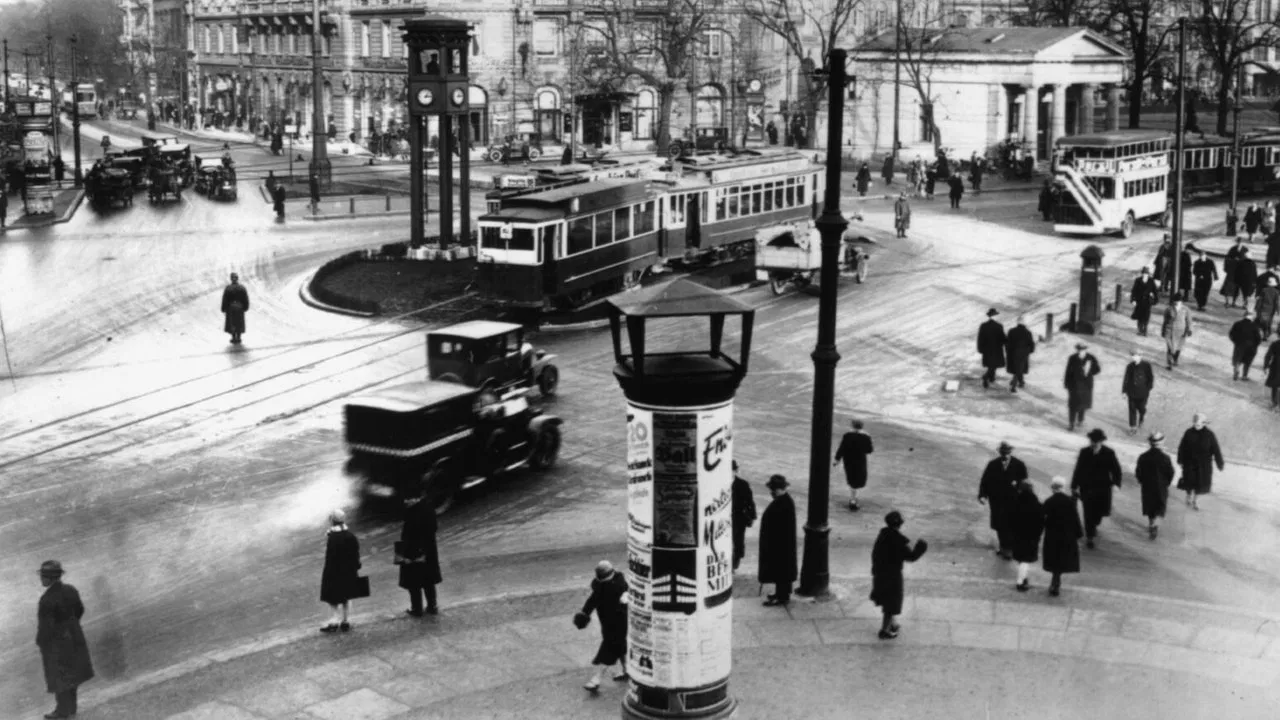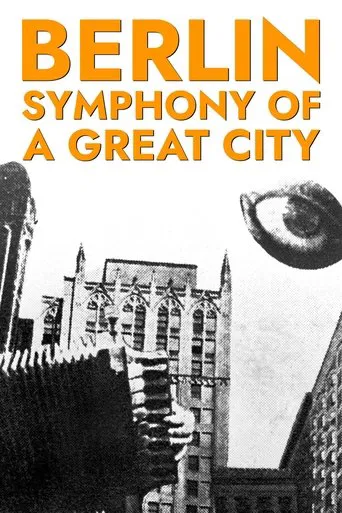Afouotos
Although it has its amusing moments, in eneral the plot does not convince.
Voxitype
Good films always raise compelling questions, whether the format is fiction or documentary fact.
Sienna-Rose Mclaughlin
The movie really just wants to entertain people.
Ella-May O'Brien
Each character in this movie — down to the smallest one — is an individual rather than a type, prone to spontaneous changes of mood and sometimes amusing outbursts of pettiness or ill humor.
MARIO GAUCI
This documentary has much to answer for, since it started a trend for city-based films: in its case, being a non-narrative look at the thriving German metropolis (though there were a number made in that vein), the original impact has essentially faded with imitation – and its place in the cinematic pantheon overtaken by such classic dramas of 'ordinary people' as F.W. Murnau's SUNRISE: A SONG OF TWO HUMANS (1927) and King Vidor's THE CROWD (1928). The end result – bafflingly split into five unnamed acts, thus boasting no specific characteristic to differentiate them! – nevertheless makes for a veritable time-capsule of an era that is long-gone and, therefore, looked upon now with a certain degree of romantic nostalgia.The style – among the credits are such luminaries of German Expressionism as Carl Mayer and Karl Freund! – is intermittently flamboyant (notably the opening rapid-fire montage simulating a speeding train's entry into Berlin and the concluding rotating shot of the city at night dissolving into a full-blown fireworks display) but generally pretty straightforward, content merely to document the bustling ongoing activity – encompassing virtually all strata of society – from early morning till after dark (literally "a day in the life"). Still, for all its supposed naturalism (including the unsightly image of a pair of pigeons nonchalantly pecking away at a turd on the pavement!), certain scenes were obviously staged for maximum impact – such as a tussle between two men that causes such a commotion as to necessitate Police intervention (which is then conveniently captured from all possible angles!).
MisterWhiplash
Berlin: City Symphony is one of those early experiments in montage - early as in before sound was invented and right after Battleship Potemkin changed everything. It's not always montage, as some might believe from its recommendations (i.e. Koyannasquati), as the director Walter Ruttmann is making documentary as much as city-scape. It's about a full day and night among the dwellers and the objects of a city: the moving trains, the people shuffling by about their various concerns, and the people at jobs and things like a factory at work and phones being answered used for editing fodder.Some of this is dazzling work, cut and speed up to reflect a mood of a city that is vibrant and hectic, imaginative and crazy, and sometimes tending for the dramatic. Ruttmann also has a rather weird design with the pacing at times; a woman in one 'scene' looks over a river, and in a state of sorrow falls over. People rush over to see what has happened, and we see a shot of the water and the woman gone under... and then it cuts right away to a beauty pageant! It throws a viewer off to see Ruttmann's unconventional choices, and how images flow together like the racers (cars, horses, people, boxcars), and there develops a simple but engrossing poetry of people as "actors" in front of a camera on their daily travels or having fun like at the funshow in the auditorium. It's not always as exciting or delirious as a Russian counterpart like Man with a Movie Camera or Kino Eye, but it pays loving tribute to its city at its time and place, showing the light with the dark, the commonplace with the unusual.
TooShortforThatGesture
One can understand why this film might be important to the development of a certain film aesthetic. One can understand why it might have been interesting to view back in its day. But (much like Vertov's Man with a Movie Camera) I found it dull to watch today. Much early 20th-century fascination with large machinery, lots of shots alluding to "man as cog in the machine" Leninism, etc etc etc. And, as someone else here has noted, a number of the the "documentary" shots were clearly staged, which undercuts somewhat the life-on-the-street feeling the film is trying to convey.It is somewhat interesting to see pre-WW2 Berlin, but the editing moves so quickly that one really can't get a good sense of the city. I understand that, arguably, that was part of the point -- e.g. that all cities are the same, but being able to really look at pre-war Berlin might have made it a more intriguing film today.Overall, to me at least, it felt too much like a series of nickelodeon shorts pieced together for a false, or at least dated, effect.
jan onderwater
Classic and splendid film that is still fascinating to watch. Walter Ruttmann did not make a documentary about Berlin, although 75 after date it certainly can be considered a document about a Berlin that is no more, he composed a film that tries to catch the essence of the atmosphere of a big city. The film is a good example of the art style Neue Sachlichkeit (functionalism): it is a cross-section of Berlin's life in which every element is equally important, shown without comment and in its totality it is the expression of the joy of Berlin's life. It is not a film about the life of Berliners, it is Berlin seen as a living mechanism.The subtitle referring to Großstadt (big city) is the key, it could have been any other city. The idea as such is not the makers' prerogative. Elsewhere the fascination with the hustle and bustle of the big city was also present as was the idea to catch this on this film and in music: e.g. Cavalcanti in France made a film about Paris and the US Ferde Grofé composed his musical suite Metropolis (1927) with New York in his mind. The irony of all these endeavours is that the film or music is abstract, but that the result is a romanticizing view.Ruttmann made several abstract film and he refers to them in the beginning with abstract horizontal lines dissolving to rail way tracks. In my view the rest of the film is also abstract. Although we see real people and situations the brilliant editing constantly keeps the film abstract: the situation and the people in a shot are not important, important is the juxtaposition to other shots: is the composition varied enough?. Thus we see a filmic composition (in stead of a musical one) and the subtitle Symphony is just. As with every composition the theme has to be modulated to keep it interesting and it is here where the weakness of the film is. The building up from the start and elaboration up to the beginning of the afternoon is splendid, precise and exiting; but from that point it bogs down for a while: we see another shop, another street etc. without adding much to what already was. It may be that Ruttmann was aware of this, note how quickly he finishes the afternoon to continue with the night-life and then immediately all the excitement and filmic fun is back.In an 1939 interview cameraman Karl Freund said that everything possible was filmed using only candid cameras. I have my doubts. Let's take for example the sequence of the drowning lady: how could he make an extreme close-up with a hidden camera in such a brilliant angle? (By the way: if she really tried to commit suicide, was Freund himself not only one of the gaping bystanders without doing anything to save her?) How could he foresee the right angle to film the prostitute picking up her client near the cornered shop window? Not that it matters for the quality of the film, but it proofs the old adagium: filming is deceiving.

